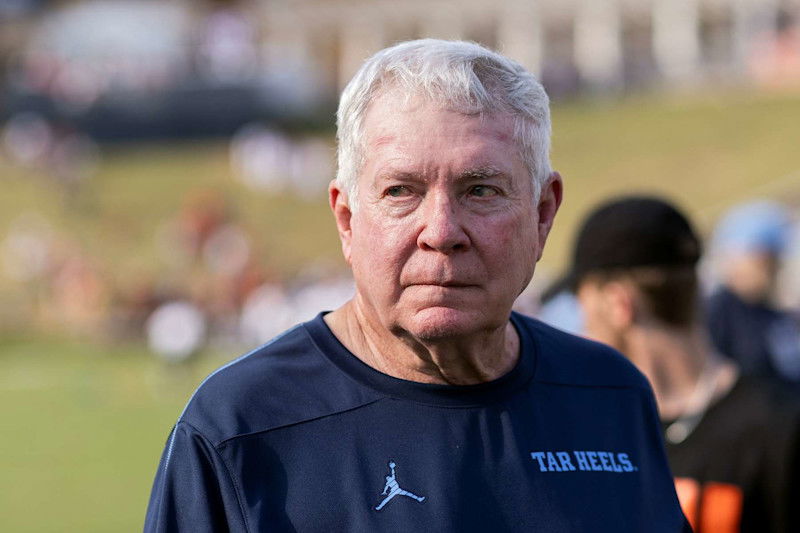

Mack Brown’s future was in doubt after a tough campaign. Despite earlier assurances of his return for the 2025 season, the school decided in late November to part ways with Brown as head coach. Brown, in a heartfelt statement, thanked UNC for 16 years of building significant relationships with the program and players. Soon after his exit, Brown became an outspoken critic of the transformation engulfing college football, particularly as his replacement, Bill Belichick, arrived with a wave of fresh resources and a roster reshuffle.
Watch What’s Trending Now!
While on the sidelines, Brown noticed the new era wasn’t just about money and celebrity signings. Belichick now faces challenges dealing with UNC’s roster, comprising over 60 transfers, set for success today but facing more complexity in reality.“They’ve changed the roster,” Brown said, “but it’s not easy to build a team when you’re constantly starting over with new faces every year.” And with a completely new roster comes a relatively different NIL structure for the athletes. “The people out there need to know this model is unsustainable,” Former Alabama legend Nick Saban said on the Pat McAfee show. “It’s not good for players.”
ADVERTISEMENT

In the 19th June 365 sports, David Smoak dived into some intriguing and eye-opening insights presented by Mack Brown. “When you transfer, there’s about a 63% chance that you graduate if you transfer one time because some of your classes don’t transfer,” Brown says. Brown revealed the turmoil of the transfer portal, NIL contracts, and the nonstop pressure cooker that players and coaches today face. He continues, “Imagine transferring a second time, a third time, a fourth time, or a fifth time, they’re not going to graduate, they won’t have a home, they won’t have a relationship with boosters that can help them get jobs.”
ADVERTISEMENT
When a college player chooses to transfer, it may be the break they need—a second chance at playing time, a fresh coaching staff, a kinder academic climate. But the surface numbers paint a different picture. Why? Because if you transfer schools, not all those hard-earned credits come along for the ride. It’s not uncommon for student-athletes to lose 60–70% of their credits when they transfer from one school to another. Now think about transferring four to five times. The chances of graduating plummet. Each transfer upsets educational advancement, requires student athletes to repeat courses, and, in some cases, postpones graduation years.
Former quarterback JT Daniels and other players find that many credits don’t transfer, complicating their path to a degree. Thinking of Caleb Love and Myles Hinton also provides the same fundamentals. JT Daniels starts at USC, then moves to Georgia, West Virginia, and even Rice, seeking new opportunities like more playing time or a better fit. However, each transfer poses academic challenges, with some credits not transferring. Then there’s star basketball player Caleb Love and standout offensive lineman Myles Hinton. Michigan foiled Love’s transfer plan from North Carolina by refusing to take enough of his credits to get him eligible immediately. He had to scramble, ending up in Arizona instead.
ADVERTISEMENT
For Myles Hinton, the transition from Stanford to Michigan appeared to be a wonderful opportunity—until he learned that most of his credits, particularly in his desired major, did not transfer. He had to repeat courses, even though he had already completed them at Stanford, simply to remain on target for graduation. Coaches and schools often sideline or rearrange academic paths for many athletes to maintain their eligibility, highlighting the high price athletes pay for pursuing their dreams in the sports field. “I’m really worried about mental health, and that sounds like an old coach,” Brown says.
It is sort of true; they hold NIL deals over players’ heads like carrots, and the potential for more playing time, greater exposure, or a chance at a championship perpetually lies just one transfer away. “We get away from the importance of the degree that’s when they feel good about themselves, that’s when they have opportunities to get jobs, and they get jobs with the boosters that they had relationships with while they were at school, and if they’re at five different schools, they’re not going to have that relationship,” Brown adds.
Mack Brown emphasizes how alumni and boosters support players after graduation, aiding in their growth, confidence, and career prospects. There is a growing concern about the rising psychological toll on players, prompting Brown to call for more transparent and supportive management from administrators. He is kind of worried for his former program after Belichick took over the Tar Heels’ reign. A lot has changed in the system, especially in terms of the financial structure.
ADVERTISEMENT
The Brown-Belichick clash
Mack Brown, who had built his career at UNC on fit, family, and occasionally tough academic requirements, sat on the sidelines as his successor, Bill Belichick, with a $10M/year deal, revamped the program. On SiriusXM, Brown spoke candidly. He accused UNC of relaxing academic requirements and investing in the football program to assist Belichick in constructing a powerhouse. In Brown’s opinion, UNC had compromised a little of its intellectual integrity in pursuit of football stardom, and he wasn’t afraid to say so.
Since Belichick came into town, UNC has reportedly collected over $20 million in NIL money, accepted more than 60 transfers, and attracted high school players to Chapel Hill like Chapel Hill is a new football mecca. Brown, on the other hand, had struggled during his last few years to attract elite talent, in large part due to the high academic standards of the school and a lack of NIL resources. But Brown’s statements weren’t merely a discussion of the numbers. They were about legacy—and perhaps a little pride.
ADVERTISEMENT
He even confessed to feeling guilty about failing to pay players, and he stood by helplessly while some of his top athletes were poached for higher offers elsewhere. If Belichick succeeds, Brown can claim it’s because the system became softer. If Belichick falters, Brown can look at the anarchy and say, ‘I told you so.’ Either way, Brown is positioning himself to have the last word, regardless of how the Belichick era goes.
Top Stories
Colts Issue Statement on FBI Investigation Into Jim Irsay’s Death as Controversial Details Emerge After Former Owner’s Passing

“Be Respectful”: Coco Gauff Shuts Down Crowd Comment as She Backs American Rival at Australian Open

Scottie Scheffler Injures Fan in the Head at American Express as Painful Moment Is Caught on Camera

Prayers Pour in for PGA Tour Champions Star as Cancer Diagnosis Comes to Light

Viral 4-Year-Old NFL Picks Girl Faces Death Threats After Cardi B’s Profanity-Laced Rant and Subsequent Apology

‘Hideous’: Jason Day Sparks Outrage With Outfit Choice at PGA Tour Season Debut

ADVERTISEMENT
ADVERTISEMENT
ADVERTISEMENT



